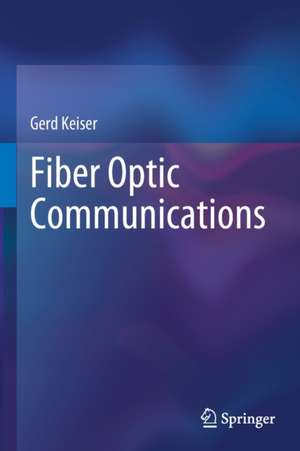Fiber Optic Communications
Autor Gerd Keiseren Limba Engleză Paperback – 4 mar 2022
| Toate formatele și edițiile | Preț | Express |
|---|---|---|
| Paperback (1) | 475.91 lei 6-8 săpt. | |
| Springer Nature Singapore – 4 mar 2022 | 475.91 lei 6-8 săpt. | |
| Hardback (1) | 608.63 lei 6-8 săpt. | |
| Springer Nature Singapore – 3 mar 2021 | 608.63 lei 6-8 săpt. |
Preț: 475.91 lei
Nou
Puncte Express: 714
Preț estimativ în valută:
91.06€ • 95.09$ • 75.20£
91.06€ • 95.09$ • 75.20£
Carte tipărită la comandă
Livrare economică 15-29 aprilie
Preluare comenzi: 021 569.72.76
Specificații
ISBN-13: 9789813346673
ISBN-10: 9813346671
Pagini: 639
Ilustrații: XXIII, 639 p. 315 illus., 63 illus. in color.
Dimensiuni: 155 x 235 mm
Greutate: 0.92 kg
Ediția:1st ed. 2021
Editura: Springer Nature Singapore
Colecția Springer
Locul publicării:Singapore, Singapore
ISBN-10: 9813346671
Pagini: 639
Ilustrații: XXIII, 639 p. 315 illus., 63 illus. in color.
Dimensiuni: 155 x 235 mm
Greutate: 0.92 kg
Ediția:1st ed. 2021
Editura: Springer Nature Singapore
Colecția Springer
Locul publicării:Singapore, Singapore
Cuprins
1. Perspectives on Lightwave Communications.- 2. Optical Fiber Structures and Light Guiding Principles.- 3. Optical Signal Attenuation and Dispersion.- 4. Light Sources for Fiber Links.- 5. Optical Power Coupling.
Notă biografică
Gerd Keiser is Research Professor at Boston University and Professor and Consultant at PhotonicsComm Solutions, a firm specializing in education and consulting for the optical communications and biophotonics industries. Previously, he was involved with telecom technologies at Honeywell, GTE, and General Dynamics. His technical achievements at GTE earned him the prestigious Leslie Warner Award. In addition, he has served as Adjunct Professor of Electrical Engineering at Northeastern University, Boston University, and Tufts University and was Industrial Advisor to the Wentworth Institute of Technology. Formerly, he was Chair Professor in the Electronics Engineering Department at the National Taiwan University of Science and Technology. He also was Visiting Researcher at the Agency for Science, Technology, and Research (A*STAR) in Singapore and at the University of Melbourne, Australia. He is a Life Fellow of the IEEE, Fellow of OSA and SPIE, Associate Editor and Reviewer of several technical journals, and Author of five books. He received his B.A. and M.S. degrees in Mathematics and Physics from the University of Wisconsin and a Ph.D. in Physics from Northeastern University. His professional experience and research interests are in the general areas of optical networking and biophotonics.
Textul de pe ultima copertă
This book highlights the fundamental principles of optical fiber technology required for understanding modern high-capacity lightwave telecom networks. Such networks have become an indispensable part of society with applications ranging from simple web browsing to critical healthcare diagnosis and cloud computing. Since users expect these services to always be available, careful engineering is required in all technologies ranging from component development to network operations. To achieve this understanding, this book first presents a comprehensive treatment of various optical fiber structures and diverse photonic components used in optical fiber networks. Following this discussion is the fundamental design principles of digital and analog optical fiber transmission links. The concluding chapters present the architectures and performance characteristics of optical networks.
Caracteristici
Discusses the fundamental principles of optical fiber technology and its application to telecom networks Contains examples/exercises for students to understand the concepts better and is richly illustrated Presents a comprehensive treatment of various optical fiber structures and diverse photonic components used in optical fiber networks
